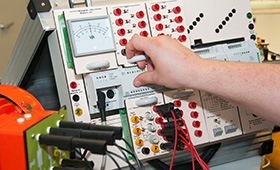Threat of dramatic skilled labour shortage in electrical engineering and supply occupations
BIBB President Esser: "Further strengthen the dual system of vocational education and training"
09/2015 | Bonn, 11.03.2015

A dramatic skilled labour shortage threatens to affect the electrical engineering and supply occupations. According to a special evaluation by the German Federal Institute for Vocational Education and Training (BIBB), some 760,000 gainfully employed people will be lacking by the year 2030 in these two occupational fields alone, if the current developments of influx and departure of these specifically qualified professionals on the labour and apprenticeship market continue unchanged. The special evaluation is based on the qualification and occupational field projections jointly carried out by the BIBB and the Institute for Employment Research (IAB).
In addition to demographic change, the main reasons for this development are the sustained "urge" of young people to attend grammar schools and universities and the fact that especially technically inclined grammar school graduates prefer a degree course, for example, in engineering rather than an apprenticeship plus advanced training in these occupational fields.
According to BIBB President Friedrich Hubert Esser "massive shortages and distortions" will affect the skilled trades in particular. "In a long-term comparison, the employment opportunities in the skilled trades cannot compete with industrial and academic professions against the background of increasing competition", warned the BIBB President. "What we need is a significant increase in the appreciation of dual system vocational education and training in our society and less emphasis on increasing the rate of university graduates as a single objective. To this end, employment in small businesses must become an attractive alternative to employment in large companies or civil service institutions also for young people with a university entrance qualification."
The BIBB President continued to say that a whole bundle of education policy measures is required to increase the attractiveness of the vocational education and training system. He said that it now is particularly important to use existing potential to a far greater extent than has been the case so far. "This particularly applies to young people with lesser school qualifications and those from a migration background as well as to improving career guidance, to recognition of foreign professional qualifications and to integration of migrants and refugees into the labour and apprenticeship market."
According to the BIBB special evaluation, the situation has become particularly dramatic in the supply occupations as part of the occupational field of "metal and plant construction, sheet metal construction, installation and assembling". Some 726,000 gainfully employed people will retire in this occupational field in the period 2012 to 2030. Yet according to the BIBB's calculation, only some 270,000 people with this specific qualification are expected to enter the employment market. So by 2030, nearly 460,000 qualified professionals will be lacking in this field alone.
The supply occupations include occupations in the fields of sanitary, heating and air conditioning systems, furnace and hot-air heating construction, refrigeration engineering, supply and waste management, water supply and waste water treatment engineering, pipeline construction and waste management.
The development in the electrical engineering occupations is similar, although not quite as dramatic. By 2030, some 648,000 gainfully employed people will have retired from this occupational field. Yet according to the BIBB's calculations, only 350,000 gainfully employed people are expected to start in this field. This results in a prospective shortage of nearly 300,000 qualified professionals with this specific qualification.
The electrical engineering occupations include a total of more than 60 individual occupations, in particular occupations in the fields of construction electrics, electrical machine technology, energy and power plant engineering, electrical operating technology, line installation, electrical and information technology, telecommunication, microsystems technology as well as aviation, shipping and vehicle electronics.
Download of the special evaluation on the BIBB website under www.qube-projekt.de
Further information in: Zinke, Gert; Schenk, Harald; Wasiljew, Elke: "Berufsfeldanalyse zu industriellen Elektroberufen als Voruntersuchung zur Bildung einer möglichen Berufsgruppe", Wissenschaftliche Diskussionspapiere (Academic Research Discussion Papers), Issue No. 155, German Federal Institute for Vocational Education and Training (BIBB), 2014. (available in German only)
Download under www.bibb.de/veroeffentlichungen/de/publication/show/id/7456
Images are available under www.bibb.de/pressefotos.
Specimen copy requested.